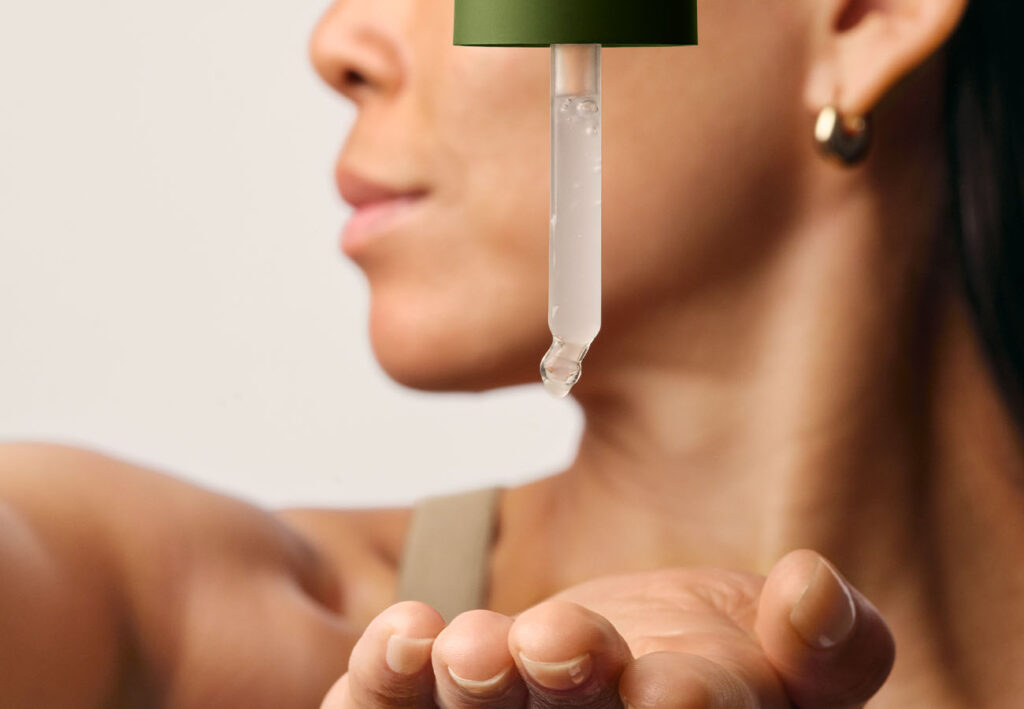What is Vitamin C and How Does it Work for the Skin?
1. Protects Against Sun Damage
Harsh ultraviolet light can cause severe skin damage without proper protection. But vitamin C, with its high levels of antioxidants, can add an extra barrier against the sun’s harmful rays. But this doesn’t mean it can replace sunscreen!
Too much sun exposure can cause the skin to develop excess free radicals, which may damage cells and collagen. The antioxidants in vitamin C can blunt the effects of free radicals, minimizing harm to your skin. While vitamin C shouldn’t be used instead of SPF, it does offer some much-needed extra protection.
2. Reduces Hyperpigmentation
Hyperpigmentation refers to the overproduction of melanin in certain areas of the skin. This can appear as anything from sunspots to melasma. While not harmful, hyperpigmentation is a common skin concern.
Vitamin C inhibits melanin production, making it a popular solution for those looking to fade hyperpigmentation. Over time, this can diminish discoloration and even out your complexion overall. With regular use, vitamin C can even prevent hyperpigmentation before it appears.
3. Hydrates and Brightens
Hydration is key to getting the glass skin you’ve been striving for. Without it, your skin risks becoming dry and scaly. But moisturizer isn’t the only way to keep your complexion properly hydrated.
Vitamin C has been found to help the skin retain water, keeping it moisturized throughout the day. It may even strengthen your skin’s outermost layer for greater protection against water loss.
The nutrient also works to smooth the skin and combat dullness. This can leave your complexion hydrated and glowing when used consistently.
4. Boosts Collagen Production
Collagen is a protein that occurs naturally in the body as part of connective tissue, supporting everything from tendons to hair. Your body produces less collagen as you age, which can result in visible signs of aging. Vitamin C is an important part of collagen growth. Adding it to your skincare routine can speed up production, leave your skin plump and prevent it from sagging. It can also help preserve existing collagen to keep your complexion firm and youthful.
5. Smoothes Out Wrinkles
In addition to collagen, vitamin C promotes the growth of elastin, another natural protein. High elastin production makes your skin more flexible, reducing the effect of factors like sun exposure and environmental pollutants.
By boosting your elastin levels, you can also prevent and smooth out wrinkles in your complexion. Higher elasticity means suppler skin that resists the development of fine lines. Applying vitamin C regularly can keep your face smooth and glassy while boosting your elastin levels to minimize the effects of aging.
6. Fades Scars
Extra collagen production combined with anti-inflammatory properties makes vitamin C extremely useful for repairing damaged tissue. Having a vitamin C deficiency may actually make conditions like acne take longer to heal. Applying the nutrient regularly can help blemishes heal faster, making them less likely to scar.
Existing scars may also benefit from vitamin C, thanks to the collagen boost that supports connective tissue. Over time, scars left by acne and other wounds can fade away for a clearer complexion.
7. Evens Skin Tone
An uneven skin tone can be caused by a variety of factors, including rosacea and hormones. But no matter the cause, vitamin C may be able to help.
Because vitamin C is anti-inflammatory and full of antioxidants, it is naturally suited to reducing skin redness. It can also help repair damaged capillaries that cause blotchiness for a more even complexion. Applying vitamin C after cleansing may, in time, give you the ultra-smooth skin tone you’ve been looking for.
How to Add Vitamin C to Your Skincare Routine
Vitamin C can do a lot for your skin. For best results, it’s important to incorporate the nutrient properly into your skincare routine. Here are some tips to help you out.
Apply It at the Right Time
Knowing when to apply vitamin C is essential for achieving the desired effects. It’s best to apply the nutrient after cleansing but before dabbing on your moisturizer for the greatest success with each product.
If you’ve opted for a vitamin C serum, the time of day is also an important factor. It’s usually best to apply the product at night, as the body naturally repairs itself during sleep. However, some formulas advise you to apply the serum in the morning for the best results.
Combine It With a Healthy Diet
Supplements and foods rich in vitamin C (like oranges, berries and peppers) can spread the effects across your entire body. This may give you a collagen boost in the lowest layers of your skin, keeping your complexion radiant from the inside out.
Vitamin C is a healthy addition to any diet that enhances your wellness overall. However, research suggests the best way to experience the nutrient’s effects is by applying it topically to your skin.
Find a Formula Made Just for You
Ready to design a serum filled with vitamin C and other ingredients your skin (and hair) will love? Take the Prose skin consultation today to find a formula unique to you.





